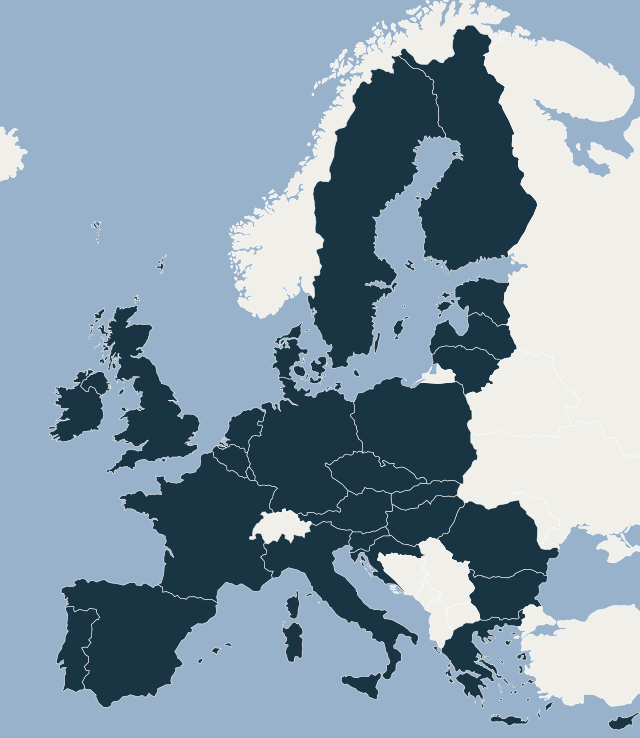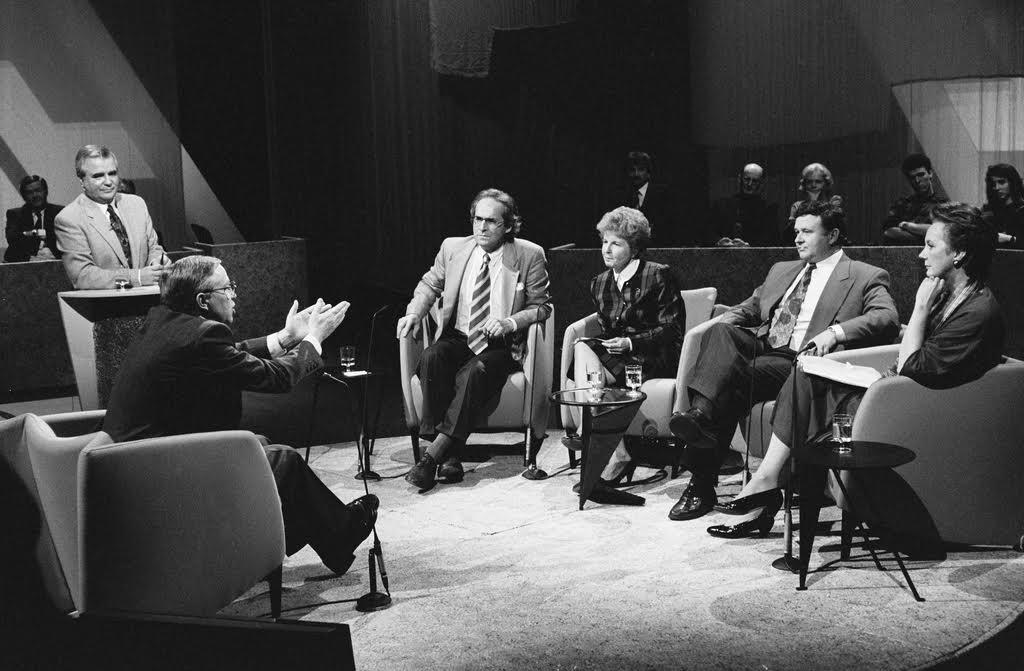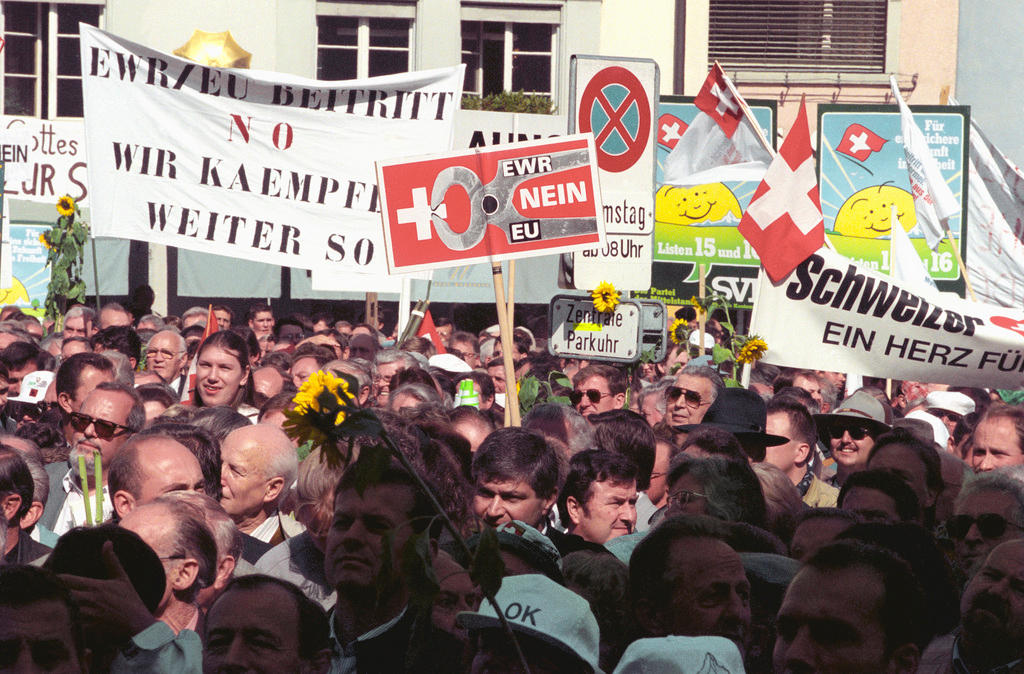
‘The EU has developed better than Switzerland’

In narrowly voting against accession to the European Economic Area (EEA) a quarter of a century ago, Switzerland decided to go it alone as a small island in the European sea. For many voters, the EEA was seen as a precursor to full EU membership. Twenty-five years later, swissinfo.ch spoke with two illustrious proponents of the pro- and anti- campaigns of the time.

More
A quarter-century of Switzerland’s special status in Europe
+ Read the interview with anti-EEA figurehead Christoph Blocher
For Peter Bodenmann, then-president of the Social Democratic Party, who was committed to strengthening Swiss cooperation with European partners, it was a heavy defeat. The Valais hotelier is still convinced he was right.
swissinfo.ch: At every anniversary of the “no” vote to the EEA, your then-opponent Christoph Blocher celebrates, while you are portrayed in the media as the big loser of that campaign. Does that bother you?
Peter Bodenmann: I haven’t seen it quite that way. It bothers me that we missed out on securing a majority of voters, because the Green Party and some of the Social Democrats – with Rudolf Strahm and Andreas Gross – campaigned against the EEA.
swissinfo.ch: In Switzerland, environmental issues were more to the fore than in other European countries. The Greens had reason to fear that their concerns would be ignored if we joined the EEA.
P.B.: In fact, the opposite happened. What country got the best marks on environmental issues at the climate conference in Bonn? The EU member state Sweden. In Switzerland, we have the impression that anyone who signs bilateral accords, or is in the EEA or even the EU, is backed into a corner.

swissinfo.ch: Switzerland has not done badly from the bilateral accords which it was able to negotiate with the EU after the “no” vote to the EEA.
P.B.: Today we have free movement of persons, the compensatory measures, and 40-ton trucks with a smart HVC [heavy vehicle charge] – and also, fairly non-discriminatory access to the European market. All things, in fact, which the EEA would have brought.
swissinfo.ch: So was it right after all not to join the EEA?
P.B.: It was wrong. Countries in the EU have developed better than Switzerland. But media and political voices here don’t want to recognise that. All the xenophobic talk has led to a false perception that is difficult to change.
swissinfo.ch: Unemployment in Switzerland is lower than in other European countries, however.
P.B.: Only people who don’t know the statistics propagate that kind of nonsense. There is only one statistic which makes the right comparison, namely the one on unemployment as defined by the ILO [International Labour Organisation]. This statistic shows that we are worse off than, say, Bavaria or Baden-Württemberg.
swissinfo.ch: Can one really compare Germany’s economic powerhouse regions with another state? One would surely have to compare these regions with the economically strongest regions in Switzerland.
P.B.: No, only someone who doesn’t know European economic geography would maintain that. There are eight million people in Switzerland, in Bavaria twelve million. In Bavaria, too, there are regions which are economically weaker such as the Bavarian Forest, so the comparison is in fact a very valid one.
Everything about the EU has developed differently from what the EEA opponents wanted us to believe at that time.
Peter Bodenmann
The lawyer from Valais is still one of the best-known figures in Swiss politics, although he retired from political life at the end of 1999 and has since been running a hotel in his home town of Brig.
Bodenmann was a member of parliament from 1987 to 1997 and was president of the Social Democratic Party from 1990 to 1997.
swissinfo.ch: What have we missed out on, then, as non-members?
P.B.: The “no” vote to the EEA was not a disaster or anything like that. The EEA would have been a good idea. But Switzerland got a second chance with the bilateral accords. These accords came at a high price and cost us growth.
The Swiss are always a bit late to react, then they do so just in time to avoid greater damage. We settled a central point of the EEA debate by acting in the way that we [Social Democrats] proposed at the time – saying yes to free movement of persons, and at the same time yes to the compensatory measures, which were always opposed by the [right-wing] People’s Party.

More
‘We were the only ones who cared about Swiss self-determination’
swissinfo.ch: If Switzerland had joined the EEA, it would have had to have foregone some of its independence. For one thing, we would not have been able to vote on the mass immigration initiative…
P.B.: Of course we would have been able to vote on it, and of course Switzerland could have implemented the initiative as it has done – in an EU-compatible manner.
swissinfo.ch: In other words, it doesn’t really matter if we belong neither to the EEA nor the EU?
P.B.: No, that’s quite wrong. I am saying that there is not a great difference between the EEA and the bilateral accords. The EEA would have had a few advantages, but nothing decisive.
It would be quite different if we joined the EU. As an EU member state, one does not just have to rubber-stamp laws decided by somebody else, but gets to be part of the decision.
The situation is quite clear: in a village where 28 people are members of a shooting club, as a non-member you can only go shooting on the range if the others allow you. Every Swiss municipality works like that.

swissinfo.ch: That would be a minority view. There is now less support for joining the EU than there was 25 years ago.
P.B.: Yes, but the issue of secrecy for tax-dodgers [i.e. Swiss banking secrecy] shows us that many things can change rather quickly. Who would have thought ten years ago that this sacred cow could be slaughtered by the Americans? And that in the executive suite of Credit Suisse, American lawyers now check over every business decision, receiving as a result honoraria of CHF 600 million?
Switzerland has an uncanny ability to adapt itself to changing circumstances!
swissinfo.ch: In the past four years Switzerland has been negotiating with the EU about a framework agreement. Christoph Blocher and the People’s Party are fighting such an agreement and denouncing it as the equivalent of joining the EEA. How do you see this?
P.B.: I have not seen even a draft of a framework agreement. We are talking merely about phantoms which the People’s Party are conjuring, and which are being relayed by the media. Switzerland and the EU will be able to solve this problem. The EU is not a centralised bureaucracy but a sort of bazaar, where haggling goes on until a solution is found.
swissinfo.ch: For some Swiss industries, the long wait for a bazaar-type solution is a strain.
P.B.: Private industry is – apart from tourism – well taken care of. Companies have free access to the labour market. They get their raw materials at world market prices. Their certified products are admitted everywhere in the EU. There is no reason to rush things.
The EEA vote
The federal government, the parliament, most of the big parties – almost all were in favour of joining the European Economic Area (EEA) in 1992. As the government was not expecting a “no” vote, it had already filed an application to join the EU in May 1992. Thus it gave a clear signal that joining the EEA was simply a step towards full EU membership.
In hindsight this was a major blunder. The opposition forces gathered around Christoph Blocher were able to turn the campaign into a very emotional debate focused on Swiss culture and tradition. They claimed that many unique Swiss qualities could only be maintained if the country stayed out of the EU. Switzerland needed to hold to its independence and remain free of the Brussels bureaucracy, they said.
The national vote on March 6, 1992 was a debacle for the political establishment. Some 50,3 % of voters said no; majorities in most cantons (16 of 23) were also against joining the EEA. In June 2016 Switzerland officially withdrew its candidacy.
Translated from German by Terence MacNamee, swissinfo.ch

In compliance with the JTI standards
More: SWI swissinfo.ch certified by the Journalism Trust Initiative



























You can find an overview of ongoing debates with our journalists here . Please join us!
If you want to start a conversation about a topic raised in this article or want to report factual errors, email us at english@swissinfo.ch.